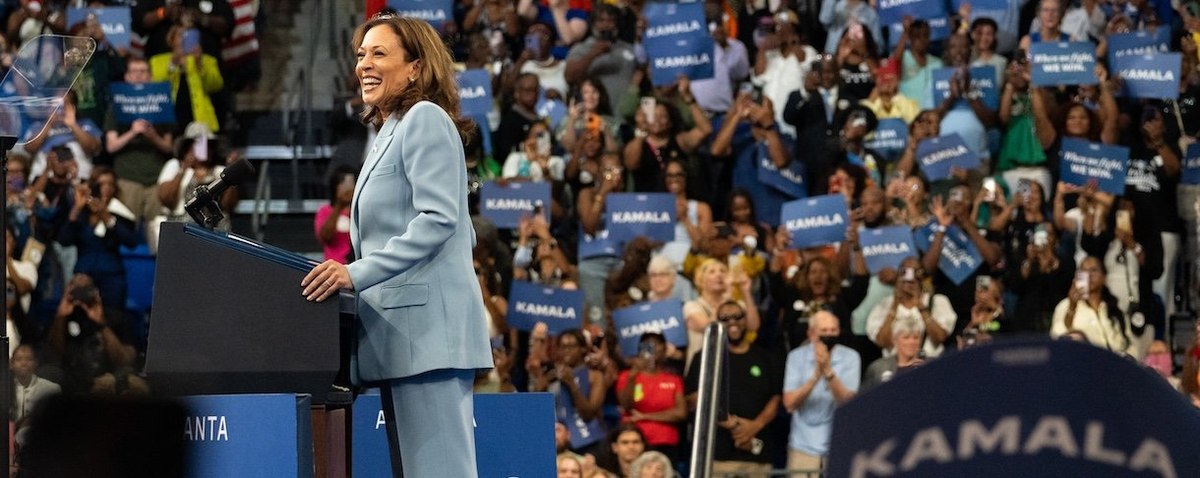This week’s Economist/YouGov poll covers the 2024 election, views of Donald Trump and Kamala Harris, the economy, foreign policy, child tax credits, and the Kids Online Safety Act.
Note: This survey completed fielding prior to Harris announcing Tim Walz as her running mate on August 6.
The 2024 Election
- Kamala Harris leads Donald Trump 45% to 43% among registered voters. This is the second week in a row Harris has led Trump, following a monthslong stretch in which Joe Biden either trailed or was tied with Trump
- 60% of Democrats say they're very or extremely enthusiastic about voting in the November election — higher than the 58% of Republicans who are.
- Democratic enthusiasm is up 2 points from 58% last week, while Republican enthusiasm is down 9 points from 67%
- This is the first time since the Economist / YouGov Poll began asking this question in March 2024 that Democrats have been more excited about the November election than Republicans
- This increased enthusiasm for Harris has also changed how Americans view the likely winner of the presidential race. 40% of U.S. adult citizens think Harris is most likely to win the presidential election, while 38% think Trump is most likely.
- This is the first time either Harris or Biden have been seen as more likely to win in Economist / YouGov Polls since October 2023
- Americans see Harris as having a better-run campaign than Trump. 50% of U.S. adult citizens say Harris' campaign is well-managed, and 27% say it's poorly managed. Only 39% say Trump's campaign is well-managed, while 42% say it's poorly managed
- This week's poll was completed before Harris announced Tim Walz as her running mate. 21% of U.S. adult citizens had a very or somewhat favorable view of Walz, while 15% had a very or somewhat unfavorable view. The rest weren't sure, a sign of how little-known Walz was among the general public
Views of Trump and Harris
- 46% of Americans have a very or somewhat favorable view of Harris, higher than the 41% with a favorable opinion about Trump and the 39% with a favorable view of Biden
- Before she became the nominee, similar shares of Americans held favorable views of Harris and Biden. Since she became the Democratic standard-bearer, however, Harris' favorability has risen, while Biden's has remained relatively stable
- 46% of Americans say Harris spends more of her time explaining what she will do if elected, while 34% say she spends more time attacking her opponent
- In contrast, 30% of Americans say Trump spends more time explaining, and 59% say he spends more time attacking
- 66% of Americans say Harris is either liberal or very liberal, and 61% say Trump is either conservative or very conservative
- Americans are slightly more likely to say Harris is moderate (18%) than to say Trump is (14%). More Americans aren't sure about Trump's ideology (18%) than aren't sure about Harris' (18%)
- Partisans tend to see the other party's candidate as more strongly ideological, and their own candidate as more moderate. For example, 78% of Republicans say Harris is very liberal, compared to just 9% of Democrats. 45% of Democrats say Trump is very conservative, compared to 22% of Republicans.
- Most Democrats say Harris is either liberal (49%) or moderate (32%), while most Republicans say Trump is either conservative (47%) or moderate (22%)
- More Americans say Harris cares a lot about the needs and problems of women, Black Americans, Asian Americans, and poor Americans than say Trump does. More say Trump cares a lot about wealthy Americans, white Americans, and men than say Harris does
The economy
- Americans have a generally sour view of the U.S. economy, and have for years
- Part of this is due to politics — when a Democrat is president, Democrats tend to view the economy more positively than do Republicans, and vice versa
- 47% of Democrats say the state of the American economy is either good or excellent, compared to 8% of Republicans
- There are much bigger differences in views on the economy between people of different political parties than there are between people from high- and low-income families
- Views on the economy haven't changed much over the past year. 44% of U.S. adult citizens currently say the state of the U.S. economy is poor, almost identical to the 43% who said that in the August 5 - 8, 2023 Economist / YouGov Poll
Foreign policy
- Most Americans (59%) somewhat or strongly approve of the recent prisoner exchange that freed Americans Evan Gershkovich and Paul Whelan along with others from Russian captivity in exchange for Russians imprisoned in other countries. 15% somewhat or strongly disapprove of this deal and 26% aren't sure
- Democrats are most likely to approve of the deal (78% approve / 6% disapprove) but Republicans (50% / 26%) and Independents (49% / 13%) are both more likely to support the exchange than to oppose it
- Majorities of Americans see France and Israel as either allies or friendly to the U.S., and Russia and Iran as enemies or unfriendly. Americans are less confident about Turkey's relation to the U.S., with 40% saying they're not sure
Child tax credit
- A bill to expand eligibility for the child tax credit and adjust its payments for inflation recently died in the U.S. Senate
- Both provisions are broadly popular. 72% of U.S. adult citizens strongly or somewhat support expanding eligibility for the child tax credit among lower-income families, while 57% support adjusting the credit for inflation
- Only 13% oppose each policy
- In general, 42% of Americans say people with dependent children should pay lower taxes than people without children, while 33% say they shouldn't
- People who are parents or guardians of children under 18 strongly support child tax breaks, with 61% in favor and 19% opposed. Non-parents are split, with 37% in favor and 37% opposed
Child online safety
- Congress is still debating the Kids Online Safety Act (KOSA), which would hold tech companies legally responsible for recommending harmful content to minors. Supporters say it will protect children, while critics say it violates the First Amendment and burdens private businesses. Americans are sympathetic to the bill's aims: 60% say holding websites legally liable for recommending harmful content to minors would likely improve child online safety, while 19% say it would overburden websites and lead to censorship of legitimate content
- A related bill under consideration, the Children and Teens’ Online Privacy Protection Act, would require websites to get parental consent before collecting information from children 16 years old or younger. 57% of Americans say the primary impact of that would be to protect minors' privacy, while 23% say the impact would be to limit minors' access to online resources
Throughout this report, some numbers may appear to be off by 1 because of rounding
— Taylor Orth contributed to this article
See the toplines and crosstabs for the August 4 - 6, 2024 Economist/YouGov Poll
Methodology: The poll was conducted among 1,618 U.S. adult citizens. Respondents were selected from YouGov’s opt-in panel to be representative of U.S. adult citizens. A random sample (stratified by gender, age, race, education, geographic region, and voter registration) was selected from the 2019 American Community Survey. The sample was weighted according to gender, age, race, education, 2020 election turnout and presidential vote, baseline party identification, and current voter registration status. Demographic weighting targets come from the 2019 American Community Survey. Baseline party identification is the respondent’s most recent answer given prior to November 1, 2022, and is weighted to the estimated distribution at that time (33% Democratic, 31% Republican). The margin of error for the overall sample is approximately 3%.
Image: Getty (Megan Varner / Stringer)
What do you think about the election, American politics in general, and everything else? Have your say, join the YouGov panel, and get paid to share your thoughts. Sign up here.














